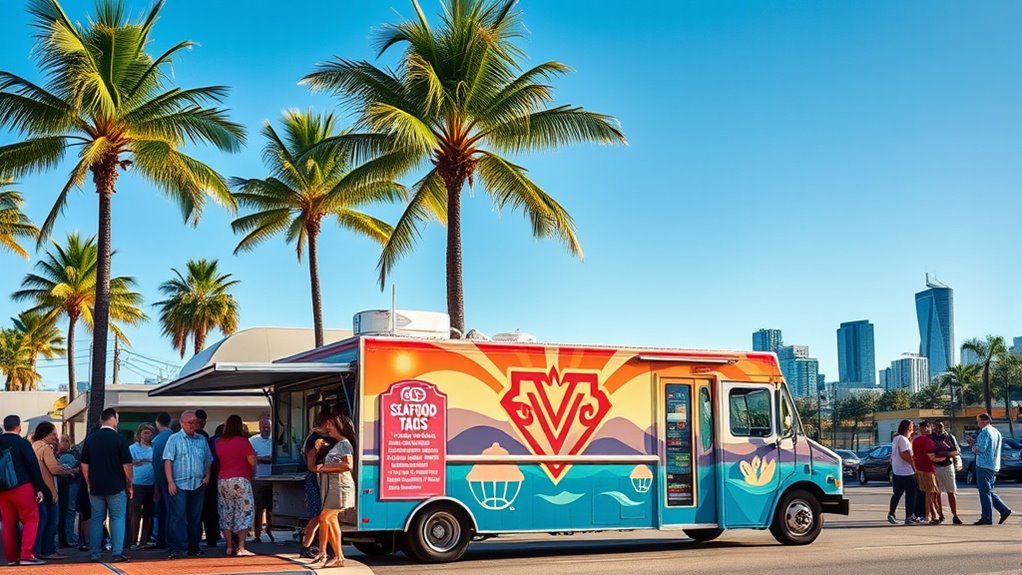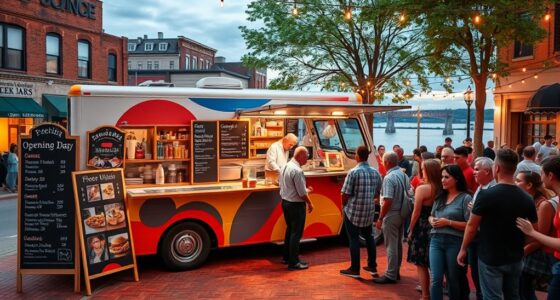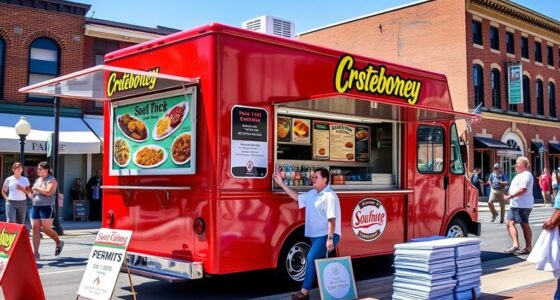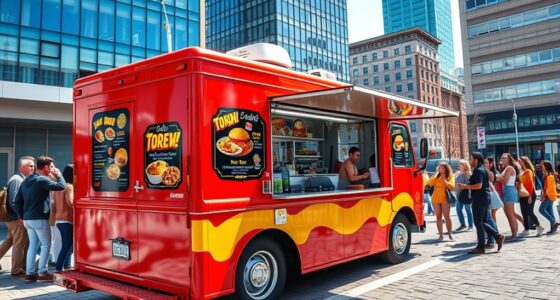To open a food truck in Tampa, Florida, you’ll need permits like a business registration ($50–$160), a mobile food license (~$230), and a health department license (~$347). Startup costs vary from $40,000 to $200,000 for vehicles and equipment. Prime locations include downtown and Channelside Dr., while your menu should focus on safe, appealing options. Effective marketing via social media and events boosts your visibility—discover more tips to turn your food truck dream into reality.
Key Takeaways
- Obtain necessary permits including business registration, health licenses, and local permits, totaling approximately $1,800–$2,000 in Tampa.
- Vehicle costs range from $40,000 to $200,000, with additional expenses for equipment, inventory, and licenses.
- Prime Tampa locations include Downtown, Channelside, South Howard Ave, and parking lots near residential and commercial hubs.
- Develop a safe, compliant menu focusing on proper handling, labeling allergens, and sourcing from approved suppliers.
- Boost visibility using social media, partnering with delivery apps, participating in local events, and implementing loyalty programs.
Navigating Necessary Permits and Licenses in Tampa
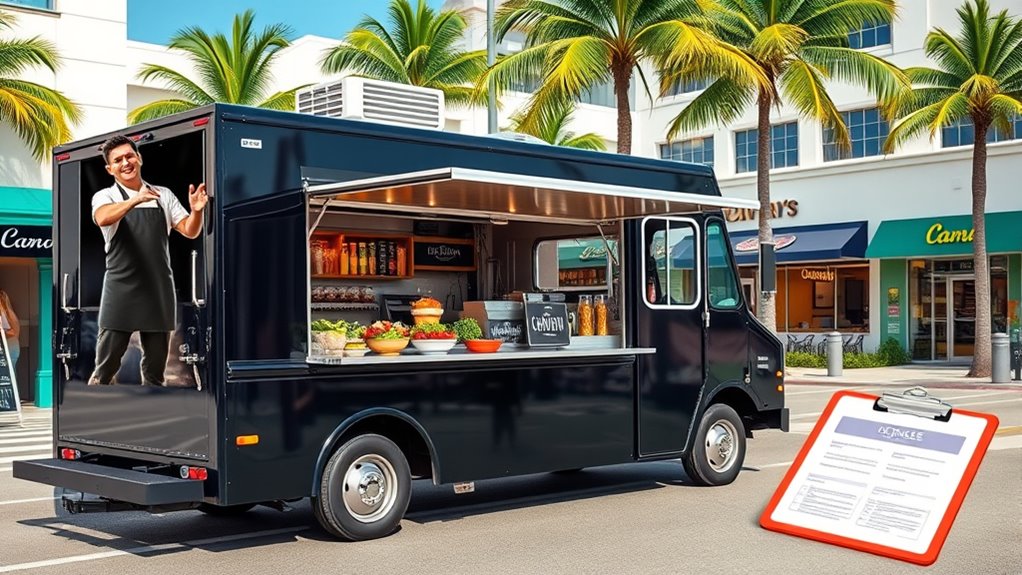
Getting your food truck up and running in Tampa requires securing several permits and licenses at both the state and local levels. First, you’ll need to register your business with Florida, which helps separate your personal and business finances. This registration costs between $50 and $160. Then, obtain a mobile food dispensing vehicle license, costing about $50 for the application plus $178.50 to $347 for the license itself, ensuring health and safety compliance. A food service license from the Florida Department of Business and Professional Regulation is also essential, costing around $347. Additionally, register with the Florida Department of Revenue for sales tax collection, which is free. At the local level, you’ll need city or county business licenses, ranging from $50 to over $500, and possibly more permits based on your operating locations and activities. Incorporating AI-driven safety measures can further streamline compliance and monitoring processes.
Estimating Startup and Operational Expenses
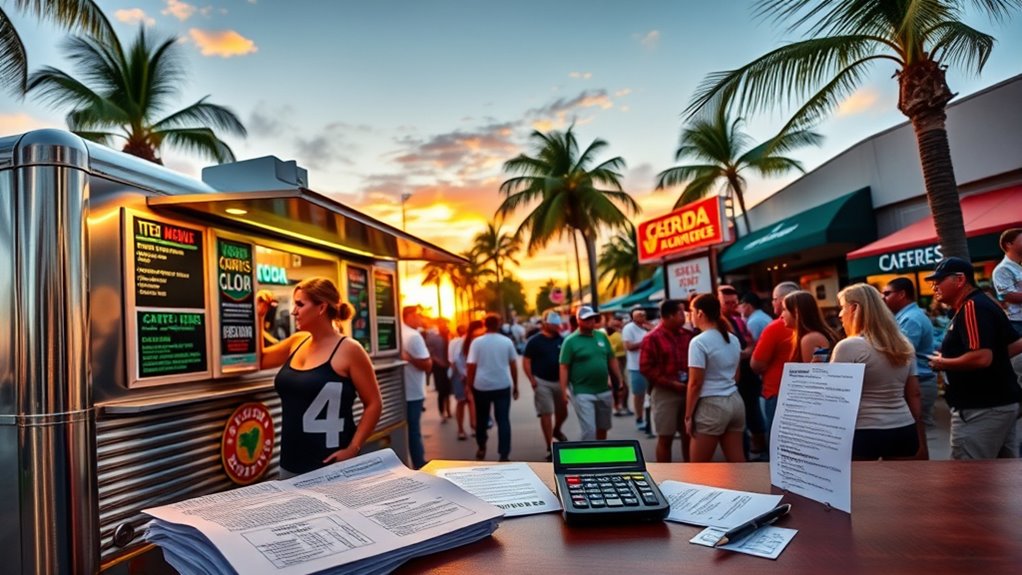
Estimating your startup and ongoing expenses is a vital step in planning your Tampa food truck business. Your costs will vary based on truck purchase, equipment, permits, and daily operations. Expect initial vehicle costs between $40,000 and $200,000, depending on customization. Equipment like grills, fryers, and refrigeration can add up to $3,000–$15,000. Licenses and permits typically run around $1,800–$2,000 in Tampa, but can be higher. Initial inventory costs are about $2,000–$3,000, covering food and supplies. Monthly expenses include fuel, maintenance, wages, and marketing. To help visualize, here’s a quick overview:
| Expense Category | Range | Notes |
|---|---|---|
| Food truck purchase | $40,000–$200,000 | New vs. used, customization |
| Equipment costs | $300–$15,000 | Cooking, refrigeration |
| Permits and licenses | $1,800–$2,000 | Local, state, insurance |
| Initial inventory | $2,000–$3,000 | Food, disposables |
| Monthly operating costs | $1,000–$2,500 | Fuel, maintenance, wages |
Additionally, cost management strategies such as menu planning and vendor negotiations can significantly impact your profitability.
Choosing Prime Locations for Your Food Truck
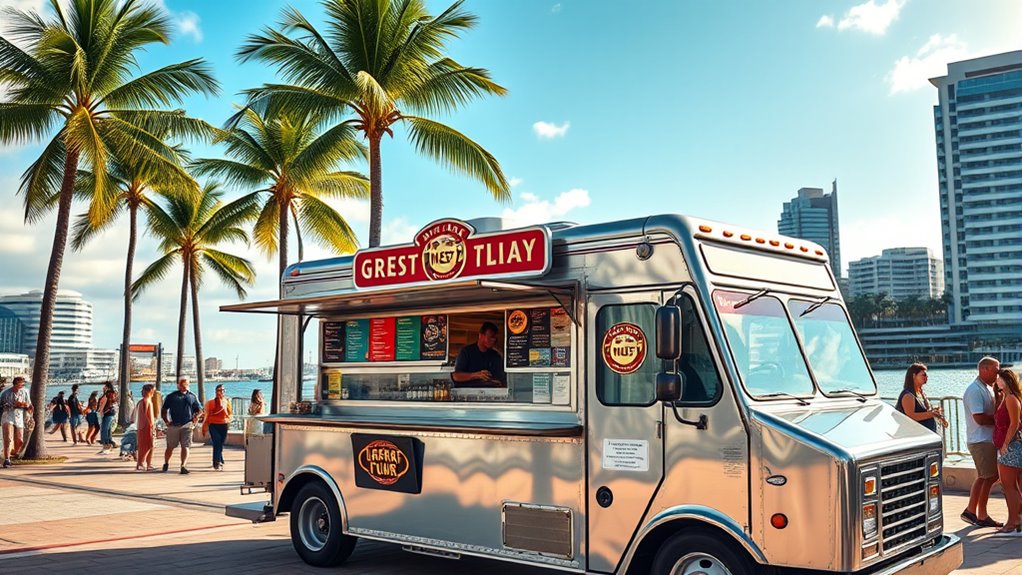
Choosing the right location for your food truck is essential to attracting steady foot traffic and maximizing sales. Prime downtown sites like 1119 N Florida Ave offer high visibility near offices, apartments, and event spaces, making them ideal for weekday lunch crowds. South Tampa’s corner at 204 South Howard Ave supports walk-in sales and catering opportunities. The Parking Madison Lot near Florida Avenue, in “Restaurant Row,” attracts busy professionals and tourists. Channelside Dr. at 1063 Channelside Dr is perfect for lunchtime rushes and event-driven traffic. These sites provide easy access, high walkability, and proximity to residential and commercial hubs, increasing your customer base. Lease costs around $1,500 monthly, with flexible agreements in some locations, but always check for restrictions on operating hours and alcohol sales. Additionally, selecting locations with a distinctive ambiance can help your food truck stand out and attract more loyal customers.
Developing a Safe and Appealing Menu
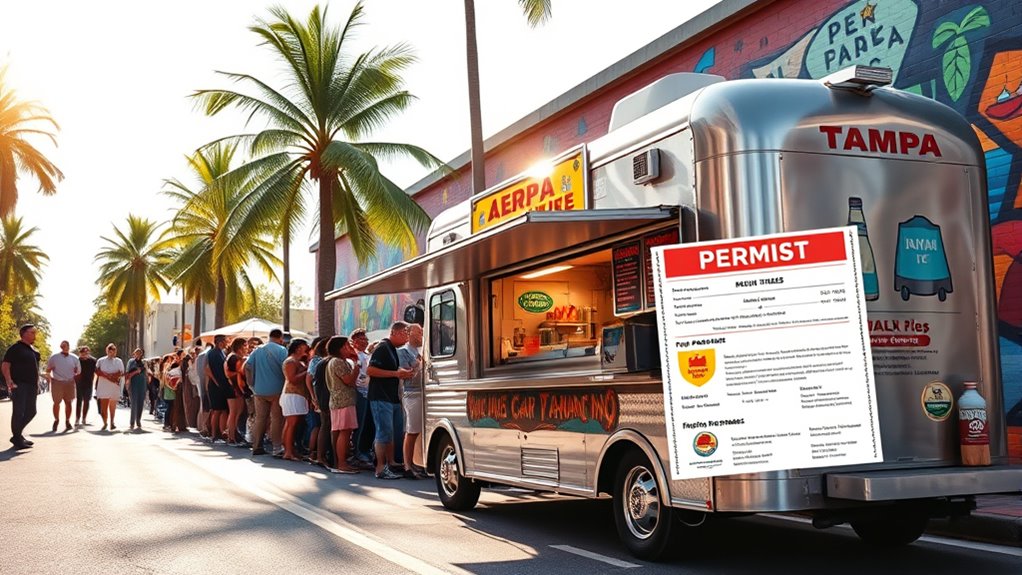
Creating a safe and appealing menu for your food truck requires careful planning to meet health regulations and attract customers. Focus on items that can be prepared and served safely within your mobile setup, emphasizing proper time and temperature controls. Submit sample menus during plan review to demonstrate safe handling. Choose ingredients that minimize cross-contamination risks, and use equipment compliant with health standards to maintain safe temperatures during cooking, cooling, and holding. Source ingredients from approved suppliers and clearly label allergens on your menu. Train staff on hygiene, safe handling, and proper cleaning procedures. Balance safety with customer appeal by offering fresh, seasonal, and diverse options, including vegetarian, vegan, and gluten-free choices. Test menu items for taste and durability to ensure consistent quality in your mobile environment.
Marketing Strategies to Boost Your Food Truck Business
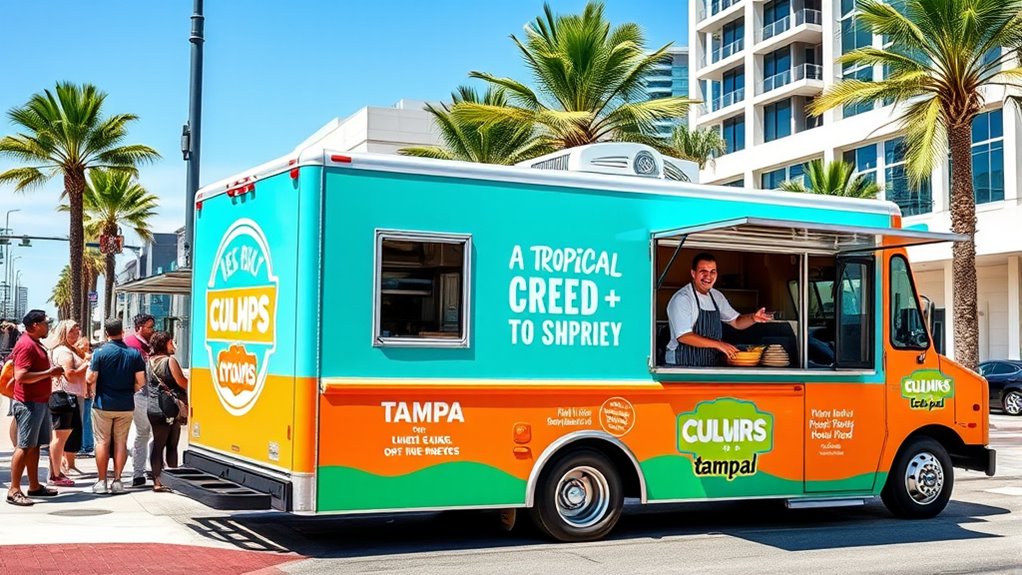
Effective marketing is key to expanding your food truck’s reach and attracting new customers. Leveraging social media platforms like Instagram, Facebook, and TikTok boosts brand visibility with engaging photos and videos of your menu and locations. Partnering with delivery apps such as Uber Eats or DoorDash can increase reach and sales by an average of 22%. Staying active online and engaging followers builds loyalty, especially among younger, tech-savvy audiences. Use trending topics like viral flavors to differentiate your offerings. Geo-targeted social ads and real-time posts about your location or events can drive foot traffic. Participating in local festivals, partnering with community organizations, and offering catering diversify income and enhance reputation. Utilize technology like geofencing and loyalty programs to further grow your business. Incorporating juice cleanse benefits into your menu or marketing can also attract health-conscious customers.
Frequently Asked Questions
How Long Does the Permit Approval Process Typically Take in Tampa?
You’re probably wondering how long the permit approval process takes in Tampa. Typically, it lasts about 3 to 6 weeks from application submission. This timeline includes around two weeks for plan review and additional days for inspections and final approvals. To speed things up, make sure your application is complete, submit everything promptly, and stay in contact with the relevant agencies. Being prepared helps you get approved faster.
Are There Any Specific Insurance Requirements for Food Trucks in Tampa?
Did you know Tampa has over 300 food trucks operating, highlighting the need for proper insurance? Florida law requires commercial auto insurance, including liability limits of at least $10,000 for property damage and PIP. Tampa may have additional local requirements, like proof of insurance for permits and event participation. Make sure you verify city-specific regulations and consider coverage for weather risks, vehicle damage, and food liability to stay compliant and protected.
Can I Serve Alcohol From My Tampa Food Truck Legally?
You can’t serve alcohol directly from your Tampa food truck unless you get the proper permits. Typically, you’ll need a special city permit or a temporary license for events like festivals. Partnering with an authorized bar or brewery is a good workaround. Remember, alcohol must be consumed on licensed premises, and you must comply with all state and local laws to avoid penalties. Always guarantee you secure the right permits before offering alcohol.
What Are the Best Times of Day to Operate in Tampa Hotspots?
Sure, because everyone loves waiting in line at the crack of dawn, right? In Tampa hotspots, you should hit peak times like lunch from 11 AM to 2 PM, dinner from 5 PM to 8 PM, and weekend brunch from 10 AM to 12 PM. Don’t forget those magical late afternoons (3-5 PM) when snack-seeking parents and workers are craving your deliciousness. Timing is everything to maximize your sales and fame!
Are There Restrictions on Menu Items or Ingredients in Tampa Food Trucks?
You’re curious if there are restrictions on menu items or ingredients for Tampa food trucks. While Florida law doesn’t specify banned ingredients, strict health and safety rules do impact your choices. You must store and prepare food under sanitary conditions, label ingredients clearly, and ensure proper refrigeration. Ingredients that spoil quickly or are hard to clean might be limited. Staying compliant ensures your menu stays within legal limits and keeps customers safe.
Conclusion
Starting a food truck in Tampa is an exciting venture with great potential. Did you know that Tampa’s food truck scene has grown over 50% in the past five years? By securing the right permits, choosing strategic locations, and crafting a mouthwatering menu, you can stand out. With effective marketing, you’ll attract loyal customers and thrive in this vibrant city. Ready to hit the streets and turn your culinary dreams into reality?
